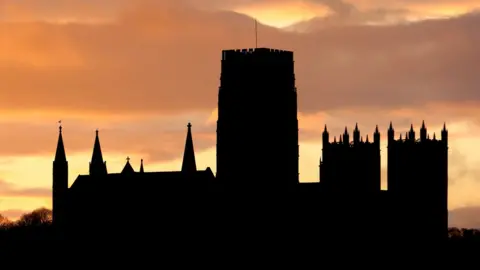What will levelling up mean for North East?

 Getty Images
Getty ImagesWhen the Conservatives swept Labour MPs out of a host of North East seats in 2019, they promised to deliver Brexit but also to "level up" areas they said had been neglected.
But what exactly did "level up" mean?
By keeping it suitably vague, it has been a phrase applied to everything from investment in railway lines to improving school exam results.
That vagueness also left a question over how anyone would know whether it had actually happened.
Now though we have a White Paper - a set of government plans and targets - that put some more flesh on the bones, and offer voters (and journalists) a chance at least to define and measure it.
It still seems pretty all-encompassing.
'Noble and desirable'
There is still talk of transport spending and improved performance in classrooms but it also set out to offer more youth clubs and the prospect of living longer.
It comes with 12 missions, measures which are there to make sure progress can be gauged. They all seem pretty noble and desirable. Who wouldn't want to be paid more, or have greater pride in where they live?
But some might also be hard to assess objectively, and there are notably no targets to explicitly bring unemployment or child poverty down - areas where the North East sits uncomfortably at the top of UK league tables.
 PA Media
PA MediaThese missions, we are told though, will guide government policy and provide some degree of accountability, and that crucial definition of what levelling up would look like.
But this is not just about what Whitehall and Westminster does to or for the region. The White Paper is also focused on handing power and resources to local leaders.
Durham could be among the first places to get a county deal involving powers moving out of London to the existing council.
The current North of Tyne mayoral area may get expanded to take in Gateshead, South Tyneside and Sunderland. All that though still has to be negotiated and confirmed.
'Devoid of ideas'
There does also seem to be some move away from forcing areas to bid against each other for money with local leaders getting greater control of the Shared Prosperity Fund - one of the replacements for the European grants that used to flow into the region.
But what about money? There is precious little new in spending commitments, and even the Secretary of State Michael Gove is clear this is about spending existing resources better and bringing decisions closer to communities.
That has led Labour to calling the White Paper devoid of ideas and energy.
It is also unlikely to win over sceptics, particularly as a government sensitive to maximising its appeal across the country is insisting levelling up is about communities up and down the nation and not about reducing a north-south divide.
The reality is of course that inequalities and problems built up over decades in the North East won't be solved quickly or even by the 2030 targets set in those 12 missions.
The task for the Conservatives is to persuade voters in their new North East seats that enough progress is being made to convince them by the next election they made the right decision to break links with Labour in 2019.
But with a cost of living crisis looming, and the controversy over Downing Street parties still resonating, it is hard to see this White Paper setting the political weather in the immediate future.

Follow BBC North East & Cumbria on Twitter, Facebook and Instagram. Send your story ideas to [email protected].
